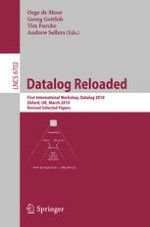2011 | Book
Datalog Reloaded
First International Workshop, Datalog 2010, Oxford, UK, March 16-19, 2010. Revised Selected Papers
Editors: Oege de Moor, Georg Gottlob, Tim Furche, Andrew Sellers
Publisher: Springer Berlin Heidelberg
Book Series : Lecture Notes in Computer Science
